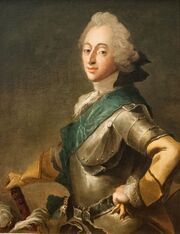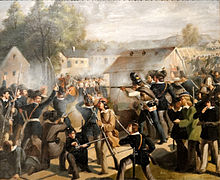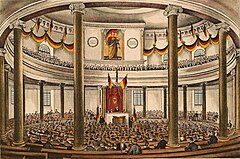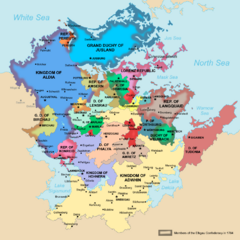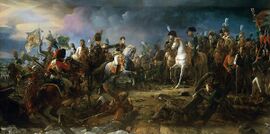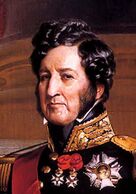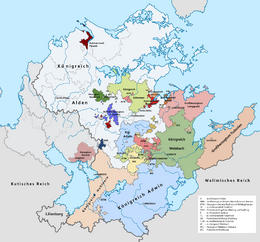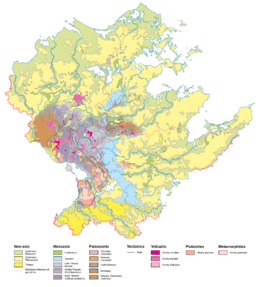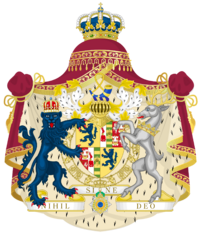Mascylla
This article is incomplete because it is pending further input from participants, or it is a work-in-progress by one author. Please comment on this article's talk page to share your input, comments and questions. Note: To contribute to this article, you may need to seek help from the author(s) of this page. |
Crowned Republic of Mascylla Gekrönte Republik Maskillien (Hesurian) | |
|---|---|
| Motto: "Hier stehen Wir" "Here We Stand" | |
| Anthem: "Geeint in Blut und Schwur" "United in Blood and Oath" | |
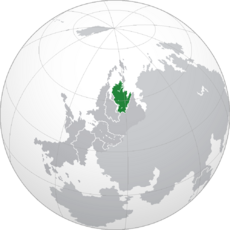 Location of Mascylla (dark green) in Berea (dark grey and green) | |
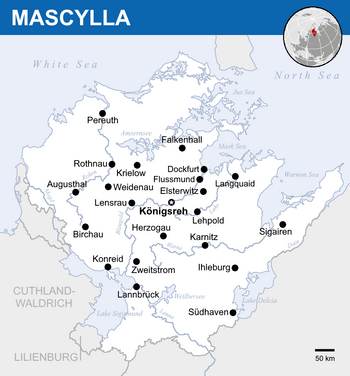 | |
| Capital | Königsreh |
| Largest city | Flussmund |
| Official languages | Hesurian |
| Recognised national languages | Cuthish, Waldish, Falian, Warnoan |
| Ethnic groups | 84.2% Mascyllary 10.5% other Telmerian 3.0% Black 2.3% Other |
| Demonym(s) | Mascyllary |
| Government | Federal parliamentary constitutional monarchy |
• Queen | Dorothea I |
| Thomas Falkner | |
| Walther Steintz | |
| Egon Weidmann | |
| Legislature | Parliament |
| Reichssenat | |
| Reichsrat | |
| Establishment | |
• Congress of Rehnern | 20 December 1757 |
| 4 September 1789—29 March 1793 | |
• Treaty of Langquaid signed | 18 May 1793 |
• Coronation of Lukas I | 23 May 1793 |
| 10 May 1923—22 January 1924 | |
• Current constitution adopted | 24 January 1924 |
• Coronation of Maximilian I | 5 March 1924 |
| Area | |
• Total | 542,017.0 km2 (209,273.9 sq mi) |
• Water (%) | 2.1% |
| Population | |
• 2019 estimate | |
• 2018 census | |
• Density | 90.4/km2 (234.1/sq mi) |
| GDP (PPP) | 2018 estimate |
• Total | |
• Per capita | |
| GDP (nominal) | 2018 estimate |
• Total | |
• Per capita | |
| Gini (2017) | low |
| HDI (2016) | very high |
| Currency | Mascyllary Karning (MKN, Ӄ) |
| Date format | DD/MM/YYYY |
| Driving side | right |
| Calling code | +47 |
| Internet TLD | .mc |
Mascylla (Hesurian: Maskillien), officially the Crowned Republic of Mascylla (Hesurian: Gekrönte Republik Maskillien) and rarely referred to as Mascillia, is a sovereign state on the Telmerian peninsula in northern Berea. It is bound to the west by X, Lilienburg and Lake Sigismund, to the south by Cuthland-Waldrich and X, to the east by X, and to the north by the North Sea and White Sea, with additional maritime borders with X to the north. Königsreh is the country's capital, and with Flussmund as the most populous city are the two main cultural and economic centres of Mascylla; other major cities and urban areas include Langquaid, Augusthal, Lannbrück, Dockfurt, Karnitz, Weidenau and Konreid. With a population of approximately 49 million inhabitants as of 2018 and a territorial area of 542,017 km2 (209,273.9 sq mi), Mascylla is both the second-most populous and second largest country in Telmeria.
Mascylla is a federal parliamentary constitutional monarchy since its formal establishment in 1793. Current monarch since 2015 and the first female head of state in Mascylla's history is Dorothea I, while Thomas Falkner is elected head of governemnt as Prime Minister since 2016. The constitution adopted in 1924 determines the separation of power is exercised by the country's Reichsrat and Reichssenat, the Kronenrat, formally by the ruling Monarch, and the High Court.
The area of what is now Mascylla was originally inhabited by a collection of Telmerian tribes, most notably the Therunders (Terunder), Falians (Fahlier), Aldens (Aldier) and Adhuins (Adhuiner) since classical antiquity. Following ill-fated attempts by the Cambran Empire to expand northward beyond modern-day Dulebia and its subsequent collapse in the aftermath of the Migration Period by 300 AD, the newly founded Albarian Kingdom annexed southern Mascylla while introducing Cambran innovations and customs to the region and developing a distinctive culture and language as the basis for modern Mascyllary culture. The presence of the Albarians prompted the slow creation of duchies and states from the Mascyllary tribes, and by 1000 AD most of Mascylla had been organized into a patchwork of petty kingdoms and duchies. Soon after, religious disputes and a prolonged series of dynastic disputes dominated Mascyllary politics in the Middle Ages, increasingly influenced by growing predecessors to the First Cuthish Empire.
After the Adwhinish Wars and War of Kalaphay Succession in 1569 and 1603 respectively, two nations had emerged as regional powers, Aldia and Adwhin, vying for hegemony over the remaining Mascyllary states, with Aldia rapidly rising with a colonial empire it had acquired from Cuthland in the 1700s. The hostilities between both nations began to grow and, following the gradual dwindling of power of the Cuthish Empire in the latter 18th century that left a power vacuum in Mascylla's central provinces, three consecutive wars of unification were fought in the 1740s, 1760s and 1770s respectively. The epitome of violence would be reached in the War of the Five Kings from 1789 to 1793, with Aldia, leading a confederacy of states against Adwhin and ultimately emerging victorious. The subsequent Treaty of Langquaid negotiated the unification of Mascylla into a nation state with a continuation of the Aldian monarchy at its helm. The collapse of Cuthland and its slow partition enabled Mascylla to vastly expand its Berean as well as Pamiran and Alvinian colonies. Moreover, Mascyllary culture and commerce flourished by the turn of the 19th century, and the Aldian colonial system expanded into a global colonial empire that was the third-largest by the 1830s. However, with the rise of the Second Cuthish Empire under X and following the Second Cutho-Mascyllary War (1830–41), Mascylla was utterly defeated and forced to cede pre-1758 Cuthish territories in Mascylla as well as a portion of its colonial possessions. The ensuing antagonization by the Mascyllary populous and the mutual hateship between both countries that had developed over the last two hundred years was a decisive factor in the causing of the Great War (1910–16). As a major participant and ultimately victor of the war with its allies, it set the terms of peace, crippling Cuthland's military, economy and territorial extent, as well as reshaping the geopolitical order through the establishment of the Assembly of Nations in 1917. War-torn conservative Mascylla however succumbed to increasing calls for reform by the worker class, with the Mascyllary Revolution overthrowing the to this point de facto absolute monarchy and instituting a democratic republic with a constitutionally regulated monarch in 1924. An unprecedented economic boom in the 1920s and 1930s quickly recovered the damaged economy while solidifying the recently introduced democracy.
The enmities left by the Great War proved to be pivotal in the later course of the 20th century, when a re-organized Cuthland leading the Mageiros League and X rivaled the western democratic nations united by the X. While Mascylla kept clinging onto its colonial possessions, the Melasian Crisis from 1941 to 1943 triggered the slow decolonization of its empire as well as the beginning of the Great Game (1944–1990). The 1960s and 1970s saw civil unrest and dissatisfaction with the country's policies, and additional terrorist movements and scandals further dragged Mascylla into a decade-long crisis, culminating into the July 20 1991 terrorist attacks. After numerous reconciliation attempts by the democratic and communist blocs and following the 1987 stock crash and financial crisis, the X collapsed, leaving Cuthland and Mascylla as the two remaining rivals of the former Great Game. Recent reapproachment with post-communist states beginning in the 1990s however kept diplomatic tensions between the two at bay.
Mascylla today retains its political, cultural and economic power amassed in the 19th and 20th centuries. As the 3rd largest economy by both nominal GDP and by PPP, Mascylla is a highly developed country. It additionally ranks highly in rankings of human development, education, political and personal freedom, healthcare, life expectancy and economic competitiveness. Generally considered to be one of the world's great powers, it is a permanent member state of the Assembly of Nations Security Council and recognized country possessing nuclear weapons.
Etymology
History
Prehistory
Telmerian tribes and antiquity
Middle Ages and Cuthish influence
Aldian and Adwhinish rivalry
Elbgau Confederacy and unification
Slow coordination
With the amplifying tension between Aldia and Adwhin following a row of conflicts in the mid-18th century that left the political dispute of Mascyllary nationalism unresolved, Albrecht II of Aldia envisioned a new political unit to coordinate customs, integrate the states' economies as well as boasting friedship among its members in order to efficiently tackle Adwhin together. The Congress of Rehnern in December 1757 concluded with the establishment of the Elbgau Confederacy, of which 12 states were initial members. Greatly upsetting Adwhin's plans of expanding its influence through dynastic ties in central Mascylla, it quickly orchestrated a move to deepen relations with its close neighbours such as the Kingdom of Holnia or Tudonia through the marriages of Princess Claudia of Merich-Karlsburg to the heir, Friedrich, of King Julian of Holnia and Prince Theodor to the daughter of Grand Duke Joseph of Tudonia. While unionists and nationalists saw the recent solidification of two large blocs as a victory and step towards unification, sovereign rulers repressing national beliefs were increasingly frustrated they would be eventually in the midst of a conflict between both sides; the fear of loosing significance or independence triggered a series of new inclusions to the Elbgau Confederacy which inadvertibly sped up Mascylla's unification. The additional creation of the Nordmaskillischer Zollverein (customs union) would further encroach on the division of Mascyllary states.
Nationalist actions and Revolutions of 1769
The results of the Congress of Rehnern in 1757 gave new motivation to the long existing movement of Mascyllary nationalism and single statehood. Various student movements and groups, most notably Junges Maskillien of the University of Tilchingen, sought to promote their belief of Mascylla's "right to be united", while heavily denouncing the Cuthish Empire's political and economic influence in Mascylla by the 1760s. While the states did not support nor represent the ideals of the growing movement, they allowed it to be distributed to the public without foreign intervention from authorities. However, numerous radicalizing groups attempted revolutions in Phalya in 1759 and Shwesia in 1765 respectively, to directly push for unification processes in broader politics, but also to establish representative government and in some cases the introduction of enlightened absolutism to its monarchies, in tandem with calls for reform and change in Cuthland and ALbeinland.
While the movement remained a fringe group of activists, their goal conincided with the political ambitions by both Aldia and Adwhin, who exploited their public popularity to bolster their vision of a united Mascylla under the leadership of their respective monarchies. Aldia emerged more sucessful with this approach however, when Aldish king Albrecht II promoted an influential leader of the movement in Aldia, Franz Kohlner, to the status of consultant to the government. While alienating the conservative members of the nobility and government, Albrecht amassed the support of the educated middle class, and following the institution of numerous reforms that brought Aldia towards a monarchy with enshrined enlightened aspects, it used its image as leverage and justification for its future leadership of Mascylla.
The social and politial discontent by reformists in other parts of Mascylla led to attempts by them to duplicate the success in Aldia. Subsequently, the July Revolutions of 1769 led to the occupation of military forts and the collapse of a number of small duchies reformed into representative democracies, the most notably of which the Republic of Konreid in 1769 and the Lorenz Republic in 1773. A council of representatives from the new states, members of the Elbgau Confederacy and other activists was assembled in Langquaid in September 1773 to draft a constitution for a unified Mascylla (Langquaider Reichsverfassung), later implemented as the charter of the Confederacy itself. In the south of the country, the revolutions were largely repressed by military force, and most of the movements were initially dissolved and exiled, with many of them fleeing north into Aldia.
War of the Five Kings and Mascyllary unification
The destabilizing effect of the attempted revolutions throughout the state further increased tension between the two coalitions led by Aldia and Adwhin. The economic integration of the two blocs additionally led to a sharp increase in economic prosperity and wealth, but on the cost of the Elbgau Confederacy needing natural resources and vital trade routes to continue its expanding economy, thus making a conflict due to the geopolitical and strategic importance of central Mascylla inevitable. The death of the aging Albrecht II and the ascension of his son and heir, Lukas I, who was vehemently in favor of national unification due to his father's efforts, was the turning point in Mascylla's history.
In March 1789, the Grand Duke of Phalya, Karl IV, suddenly died but leaving no apparent heir and the throne vacant. Aldia quickly suggested an Ahnern candidate, Lukas's brother Leopold, as Phalya's successor, but Adwhin recognizing the topographical importance of Phalya, aggressively objected and pushed for King Theodor's nephew, Prince Wilhelm, to succeed Karl IV. The issue quickly evolved into a diplomatic fiasco, and on 4 September 1789, Adwhin issued to resolve the conflict through war. While Adwhin quickly invaded Phalya, the Elbgau Confederacy was able muster a larger standing army under the command of Feldmarschall Wilhelm Stenreck, supported by a growing number of civil militias trained and equipped by Aldia. The conflict quickly escalated into a full-scale war and it became apparent the Elbgau Confederacy and its allies would emerge victorious. After numerous won battles in Eustria and Phalya over the course of two years, the Battle of Austerlitz in May 1790 was a decisive blow to the Adwhinish armies protecting the fortress of Auserburg, completely eradicating the bulk of its land army and capturing King Theodor himself. While Aldia continued to advance further south, Franz Kohlner and a trail of thousands of petty soldiers, peasants and activists, collectively known as the "Expedition of the Thousands" (Zug der Tausenden) marched onto and invaded Breisgau, Adwhin's seat of government.
Shortly thereafter, Adwhin capitulated without any peace terms and representatives of 32 Mascyllary states and free cities gathered in Langquaid to decide the political fate of Mascylla. Lukas I of Aldia was chosen to ascend the title of King of Mascyllla, the Elbgau Confederacy dissolved, and its member states as well as the defeated nations merged into a Mascyllary state. A rigorous debate erupted as to how the political system of Mascylla would actually be structured; a majority of states from the south who had a conservative view point advocated for an enlightened, but absolute monarchy, while the peasantry, middle class and a number of northern states favored a democratic republic with a monarch as its figure head. Fearing the southern states would disjoint and eventually rebel from Mascylla, Lukas I drafted a compromise betweeen the both parties, in which the monarch would have considerable power, but be advised and kept in check by elected members of government. While this compromise resolved the ongoing dispute of Mascylla's governance, Lukas had own personal aspirations as a leader of powrr and therefore detested being removed political powers. Franz Kohlner as an influential political figure first strongly opposed his proposal, but reluctantly agreed later on, burying the nation-wide hopes of a democracy for a century. The treaty itself was signed and ratified on 18 May 1793 after months of negotiation. Subsequently, Lukas I was officially coronated in Langquaid to the largest audience of nobility in Mascylla's history.
While the war itself was short, it left a devastating toll on the civilian population and southern economies who suffered from taxation and looting during the conflict. The government was largely composed of war veterans, such as Wilhelm Stenreck being elected as Mascylla's first Prime Minister, though former Adwhin and other southern states were deeply in debt, inpoverished and virtually politically unrepresented, culminating in a series of strikes and riots in 1795 which were quickly put down by Aldian military forces. However, Mascylla witnessed an unprecedented economic rise, and Lukas I massively grew in public popularity with the introduction of a new row of statutes that satisfied the expanding middle class of classical liberalists and nationalists who continued to rise in influence in national politics and commerce, while the country's separate monarchies were slowly replaced by constitutional systems.



